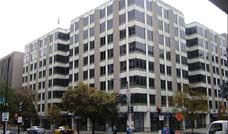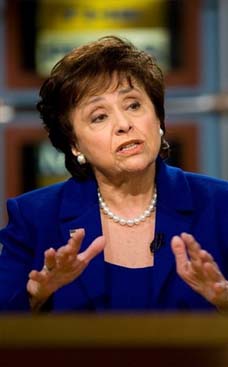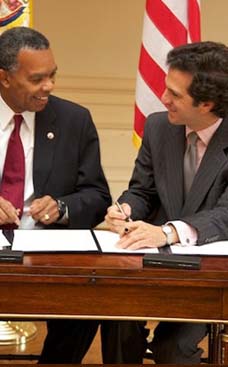
"Although we've come a long way since 1960, our journey is not complete. As long as there is suffering and strife in the world, we know that our work is not done. At this conference today, we've honored a legacy...a revolutionary idea that began here at Michigan...not to retreat into history...but to renew our faith in the power of service to catalyze friendship and peace among the peoples of the world. It's a timeless idea as vibrant today as it was half a century ago. The passion and the hope, the empathy and the enthusiasm what motivated Volunteers in the 1960s still moves Volunteers today. And my great hope is that this vision will remain forever young...embodied in the idealism of University of Michigan students...and college students across our great country...and in the spirit of older Americans too...like Muriel, in Morocco...who say, "I have the rest of my life to relax. Right now is a good time to make a difference." I envision a Peace Corps that grows and adapts to the challenges and opportunities of our time. I envision a Peace Corps that carries the torch of President Kennedy's dream, and responds to President Obama's call to service. I envision a Peace Corps that is still going strong, another fifty years from now. This towering task, that is the Peace Corps, still calls us to action. Let's see what we can build together in the years to come."
Text of Director Williams remarks to the University of Michigan commemorating JFK's historic speech
University of Michigan, October 13, 2010
Text of Director Williams remarks to the University of Michigan commemorating JFK's historic speech
Aaron S. Williams
Director, Peace Corps
Closing Plenary & Keynote
National Symposium: The Future of International Service
Ann Arbor, Michigan
October 13, 2010
INTRODUCTION
Thank you, President Coleman, for those warm words...for hosting this wonderful symposium... and, most of all, for leading this amazing institution.
"The Michigan Difference" is very real...and the Peace Corps knows that, first-hand!
[pause]
It's been a great day to reminisce and reflect on the history that happened here...half a century ago...when John F. Kennedy was greeted by 5,000 Michigan students...and he asked them a question...that ignited a movement...and inspired a generation.
It was a daring challenge: "How many of you who are going to be doctors are willing to spend your days in Ghana?"
But what began in Ann Arbor would change the way America sees the world and the way the world sees this country.
In fact, I'm just back from Ghana, where I met with dozens of the nearly 5,000 Americans who have served in that country since 1961, when the young men and women of "Ghana I"-the very first Peace Corps Volunteers-departed for Accra.
The dream that was born here in Michigan lives on.
And today, as we celebrate the Peace Corps' 50th anniversary...and 50 years of promoting international peace and friendship...we celebrate a spirit that endures.
Because the Peace Corps continues to ask big questions. We continue to issue broad challenges:
How far would you go to help someone?
What difference will you make?
In helping others to lift their lives, how will your life be transformed?
[pause]
Times have changed...but the needs persist. And, in many ways, they have grown.
The inequities that existed half a century ago poverty, disease, illiteracy, and hunger still loom large in much of our world...often exacerbated by contemporary challenges, from climate change to HIV/AIDS.
At the same time, we have tremendous new tools and opportunities to seize, in a world that has grown bigger and grown smaller, simultaneously.
Think about it: By the end of 1960, the United Nations had 99 member states. Today, it has 192.
In 1960, there were 3 billion people on earth. Today, there are 6.7 billion.
And yet, the nations and peoples of the world are more connected than ever before, thanks to revolutions in transportation and technology that have closed the distance between us.
When I served in the Peace Corps in the late sixties, I stayed in touch with my mother by writing letters. Yes, letters. Remember them? With paper and stamps and envelopes. I'd walk to the local post office, and hope that my notes arrived safely in Chicago...scheduling an appointment for a telephone call, perhaps a month in the future.
Today, nearly 90 percent of Volunteers have cell phones. They email, blog, Skype, text, and Tweet.
And they're using technology to bolster their creativity in new ways. Last summer, for example, Volunteers in Namibia created a health education program geared toward teens and young adults. Volunteers use text messages to receive and respond to health-related questions-including on topics young people might be embarrassed to pursue in person, like birth control or how to protect oneself from HIV/AIDS.
When the program was launched, Volunteers sent out more than 1,000 messages in the first month. As Volunteers elsewhere have learned of its success, they've been eager to adopt the model for other countries.
[brief pause]
So I think this is a thrilling time to be a part of the Peace Corps. A time of innovation and opportunity.
And I'd like to offer three reasons why the Peace Corps' future is as promising as its past.
1. PARTNERSHIPS
The first is because the Peace Corps works in a genuine spirit of partnership and cooperation. The Peace Corps goes where we are asked, to countries that request our help...and we support people in achieving their potential. It's a hand up, not a hand out.
That vision of assistance, and the humility it requires, has been part of our model from the start...when President Kennedy declared, "We pledge our best efforts to help [others] help themselves."
We trust host countries to know what they need. We feel privileged to help them get there. It's captured in the very first goal that established the Peace Corps' mission: To help the people of interested countries meet their need for trained men and women.
Peace Corps' works on our host countries development priorities, in partnership with government ministries and grassroots organizations. Our Volunteers live side-by-side and work shoulder-to-shoulder with the people they serve-in efforts ranging from youth development in Jordan...to distributing bed nets to combat the spread of malaria in Senegal...to promoting computer literacy in Ukraine...or teaching health and hygiene to schoolchildren in Peru.
And it's why our Volunteers focus on projects that are both meaningful and sustainable...so host communities can continue and build on those efforts, long after Volunteers have gone home.
One of my favorite examples is Camp GLOW-which stands for Girls Leading Our World. These weeklong leadership programs for young women were established in 1995, when Volunteers in Romania worked with local teachers to address the challenges that girls and young women faced in rural communities.
Since then, Volunteers all over the world from Tonga to Armenia, Belize to Macedonia have worked with community members to start their own Camp GLOWs. In many of those countries, Volunteers collaborate with local NGOs, so that local women help lead the camps, and local residents pass on their message of empowerment.
[brief pause]
Our emphasis on partnership conveys the kind of respect I believe our world badly needs. It's an approach that says, "The United States believes in human solidarity."
And we will continue to grow to support communities, near and far.
In recent years, we've expanded to new countries, including Colombia and Indonesia...and re-opened posts, including in post-conflict nations, such as Rwanda, Sierra Leone, and Liberia. By the end of 2011, we anticipate having more Volunteers serving overseas than any time since 1971.
2. AMERICA'S BEST FACE
But it isn't about the numbers in the aggregate. It's about the individuals. We're making a difference one project, one community, one Volunteer at a time.
Which brings me to the second reason I believe the Peace Corps' future is bright:
It's because we see in our Volunteers the best this country has to offer.
As Sargent Shriver once said, the Peace Corps "personifies our best qualities and deploys to the world the vision of what the United States stands for."
Generosity. Compassion. Ingenuity. Flexibility. Resourcefulness. Self-reliance.
When it comes to commitment, Peace Corps Volunteers don't just go the distance. They stay.
They learn the language. Today, Peace Corps trains Volunteers in 250 languages and in many cases our Volunteers acquire multiple languages to work successfully across local communities.
They live like their neighbors. They effect change on the ground.
They represent all 50 states, and a wide range of experience...from recent college graduates to seasoned professionals in their 30s, 40s, and 50s.
Our oldest Volunteer is a health educator in Morocco. Her name is Muriel. She's 86. (And, I might add, she has 2 great-grandchildren...and she blogs.)
To me, our Volunteers personify hope, in a way that speaks to the core of our character: The idea that, whether or not one individual can move a mountain, we each have an obligation to try...and we don't have a moment to waste.
It should make us all proud that in villages and communities all over the world, people tell stories about the Peace Corps Volunteers who came, and stayed, and in the process, gave shape and meaning to the word "America."
Some of the students in our Volunteers' classrooms have grown up to be local leaders...and even world leaders...who carry their positive images of our country into their careers.
The Peace Corps' second goal is to promote a better understanding of Americans on the part of peoples served. I believe our Volunteers are the best grassroots Ambassadors America has.
3. LEADERSHIP EXPERIENCES FOR LIFE
Finally, the Peace Corps provides thousands of Americans with the experience of a lifetime but also, with a life-defining leadership experience.
Time after time, our Volunteers say the same thing when they return whether they taught English in Panama...or worked with farmers on solar power solutions in Cape Verde...or mentored entrepreneurs in Cameroon.
They say, "I went because I wanted to help. But I got more out of the experience than I gave."
For so many who serve, their time in the Peace Corps influences everything else they go on to do. As one returned Volunteer from Sierra Leone put it, "I can never repay the people of Sierra Leone, but I can take those lessons, that personal growth, that broadened perspective, and apply it to my work back here...Any accomplishments that I might contribute, any difference that I might make in even the smallest sense...will in some way be shaped by my experience as a Peace Corps Volunteer."
Those words resonate with me, as I'm sure they do for many others.
For me, the Peace Corps was the beginning of everything. It was the door to the rest of my life.
I grew up on the south side of Chicago, and I was the first person in my family to finish college. My family expected me to do something practical with my degree, to start my teaching career.
But I found myself drawn to the kind of public service that I had heard President Kennedy speak about.
So I applied to serve with the Peace Corps. It was the biggest risk I'd ever taken in my life. My mother Blanche and my best friend Harry Simmons were the few people who understood my desire to see the world. The flights that took me to the Peace Corps training center in San Diego and then on to the Dominican Republic were the first times I'd ever been on a plane.
I worked in a small town as a teacher's trainer, helping 50 rural primary school teachers earn their high school degrees. For two years, I visited the teachers in their communities on horseback, motorcycle, or by foot to help them apply new teaching methods. The teachers voluntarily attended all-day Saturday classes during the school year, and gave up their summer vacations for even more training. They wanted to become better teachers, to access better opportunities, and I was determined to do everything in my power to help them succeed.
So I worked hard to teach. I became their friend, their coach, and their colleague. But I also learned. I learned about other cultures...and about myself.
And what I took back when I returned to the States was a belief in the power of unity and teamwork: That when we work together for a common goal, we can achieve magnificent things.
For me, as for so many others, the Peace Corps experience was nothing short of transformative-with an impact that has lasted far beyond those years abroad.
Go to any conference for international development...any public service summit...any U.S. Embassy...any gathering of civic-minded leaders. You'll be amazed by the number of people there who are returned Peace Corps Volunteers.
Take a look through the list of our returned Volunteers, and you'll find senators and cabinet members...government officials at all levels...international development experts...founders of nonprofits...corporate leaders...teachers...scientists...community activists...artists.
You can start with the more than 2,400 students from Michigan who have served, and returned to make a mark on their communities and whose wonderful stories are being captured online for all the world to see.
They share an enduring passion for service and an acute awareness of the challenges and opportunities in our interdependent world. By sharing their experience, they are helping advance the Peace Corps' third essential goal: To promote a better understanding of other peoples on the part of Americans.
And consider this: Volunteers return to the United States as global citizens, with leadership skills, language skills, technical skills, problem-solving skills, and cross-cultural insights that position them well for careers across fields and industries.
These are exactly the skills our country needs to build a globally competitive workforce. These are the skills our country needs to lead in these new times.
That's why we're determined to keeping finding and fielding the very best Volunteers-Americans committed to public service and community development. We're looking to increase our recruitment efforts across all demographic groups from new college graduates to retired professionals...from liberal-arts generalists to engineers and health workers.
And we will strengthen our investments in direct Volunteer operations, so our Volunteers have the best resources and support systems we can provide.
I hope and believe that each new generation will be inspired to serve.
FOREVER YOUNG
Although we've come a long way since 1960, our journey is not complete. As long as there is suffering and strife in the world, we know that our work is not done.
At this conference today, we've honored a legacy...a revolutionary idea that began here at Michigan...not to retreat into history...but to renew our faith in the power of service to catalyze friendship and peace among the peoples of the world.
It's a timeless idea as vibrant today as it was half a century ago. The passion and the hope, the empathy and the enthusiasm what motivated Volunteers in the 1960s still moves Volunteers today.
And my great hope is that this vision will remain forever young...embodied in the idealism of University of Michigan students...and college students across our great country...and in the spirit of older Americans too...like Muriel, in Morocco...who say, "I have the rest of my life to relax. Right now is a good time to make a difference."
I envision a Peace Corps that grows and adapts to the challenges and opportunities of our time. I envision a Peace Corps that carries the torch of President Kennedy's dream, and responds to President Obama's call to service. I envision a Peace Corps that is still going strong, another fifty years from now.
This towering task, that is the Peace Corps, still calls us to action. Let's see what we can build together in the years to come.













